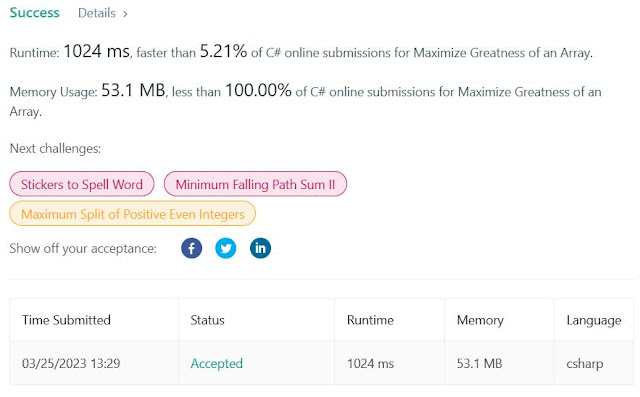Binary Search to Find Next Greater Element II
Very similar problem as solved in a different blog post, the only caveat here is that if the result of the Binary Search does not yield a greater value than the target, return the smallest one (this is the difference that I'm referring to). Code is down below, cheers, ACC.
Maximize Greatness of an Array - LeetCode
2592. Maximize Greatness of an Array
Medium
You are given a 0-indexed integer array nums. You are allowed to permute nums into a new array perm of your choosing.
We define the greatness of nums be the number of indices 0 <= i < nums.length for which perm[i] > nums[i].
Return the maximum possible greatness you can achieve after permuting nums.
Example 1:
Input: nums = [1,3,5,2,1,3,1] Output: 4 Explanation: One of the optimal rearrangements is perm = [2,5,1,3,3,1,1]. At indices = 0, 1, 3, and 4, perm[i] > nums[i]. Hence, we return 4.
Example 2:
Input: nums = [1,2,3,4] Output: 3 Explanation: We can prove the optimal perm is [2,3,4,1]. At indices = 0, 1, and 2, perm[i] > nums[i]. Hence, we return 3.
Constraints:
1 <= nums.length <= 1050 <= nums[i] <= 109
Accepted
12,887
Submissions
23,143
public int MaximizeGreatness(int[] nums)
{
int[] clone = (int[])nums.Clone();
Array.Sort(nums);
List sortedList = nums.ToList();
int retVal = 0;
for (int i = 0; i < clone.Length; i++)
{
int index = NextMaxBinarySearch(clone[i], sortedList);
retVal = (sortedList[index] > clone[i]) ? retVal + 1 : retVal;
sortedList.RemoveAt(index);
}
return retVal;
}
private int NextMaxBinarySearch(int val,
List sortedNums)
{
int left = 0;
int right = sortedNums.Count - 1;
while (left < right)
{
int mid = (left + right) / 2;
if (sortedNums[mid] > val)
{
right = mid;
}
else
{
left = mid + 1;
}
}
if (sortedNums[left] > val) return left;
return 0;
}




Comments
Post a Comment